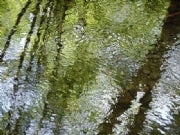“Frequently Asked Photo Questions for November” |
| Frequently Asked Photo Questions for November Posted: 29 Sep 2010 01:18 AM PDT Have a question about digital photography? Send it to me. I reply to as many as I can--though given the quantity of e-mails that I get, I can't promise a personal reply to each one. I round up the most interesting questions about once a month here in Digital Focus. For more frequently asked questions, read my newsletters from August, September, and October. Taking a Group PortraitI need to take a picture of a group of people. I have seen photos of groups where everyone looks sharp whether they're in the first line or all the way in the back. What do I need to do to get uniform sharpness throughout the photo like that? You'll want to maximize the depth of field, Mo. If you're taking group photos with the camera set to Program or Auto, you don't know what you're actually getting. So switch to Aperture Priority and dial in the smallest aperture (biggest f-number) you can. Then, if you have three or more rows of people in your group, focus on the middle row, so you ensure a region of sharp focus in front and behind the primary point of focus. If you focus on the front row, you're wasting precious depth of field in front of the group, where no one is standing. You can read about more depth of field tricks in "Four Ways to Get Stunning Depth of Field." Find Duplicate PhotosOver time, I've somehow ended up with duplicate photos on my computer and external hard drives. Is there a program that will identify duplicates and display them so that I can delete the dupes? There are a lot of programs around that will identify and eliminate duplicate files, John. I've used Duplicate Cleaner. It's a free utility that runs on Windows XP, Vista, and Windows 7. Depending on how you tell the program to run its search, Duplicate Cleaner can identify files that are identical based on content--which is ideal for photos--or it can just find files with similar file names. The program makes it easy to locate and eliminate duplicates. Making Double ExposuresCan I create a double exposure on the still mode of my Sony camcorder? How? There are very few digital cameras that have the ability to double-expose a photo, and I don't know of any camcorders that can. But you don't need to do it "in the lens," so to speak--just take two photos and combine them in a photo editing program using layers. That way, you can control the opacity of the top layer and get exactly the mix you're looking for. You can learn how to do this in "Improve Your Photos by Editing with Layers." Image Stabilization and TripodsShould I disable my lens's image stabilization feature when using a tripod? Generally, yes. If you leave image stabilization turned on while the camera is mounted on a tripod, then the camera might interpret artifacts in the sensor's data--like digital noise--as motion, and end up compensating for an effect sometimes called "ghost motion." And that can result in adding blur to a photo that would otherwise have been perfectly sharp. Some cameras and lenses are more susceptible to this than others, so you might want to do some hands-on experiments of your own. But my general advice is to switch it off. For more details, see "Using Your Camera's Image Stabilization." Restoring Deleted PhotosI lost a large quantity of photos that I had not backed up when my laptop was recently stolen, and wonder if they could still be recovered from the camera's memory card. Are there limitations to what can be restored related to time, quantity, or quality? It is possible to get back deleted photos from a memory card, Siobhan, but there are some limitations. When you delete a photo from a memory card (or a hard drive, for that matter), it's not really erased until you add new data that physically overwrites it. So what you're going to be able to recover, in most cases, is only the last set of photos you had stored on the card, since they likely had over-written any older photos you might have had before that. There are a lot of data recovery programs out there, and a few are even free. I recommend Digital Photo Recovery, which is free and works well. In fact, you're unlikely to get better results from a commercial program as long as you're trying to recover deleted files from a working, noncorrupted storage medium. Hot Pic of the WeekGet published, get famous! Each week, we select our favorite reader-submitted photo based on creativity, originality, and technique. Here's how to enter: Send us your photograph in JPEG format, at a resolution no higher than 640 by 480 pixels. Entries at higher resolutions will be immediately disqualified. If necessary, use an image editing program to reduce the file size of your image before e-mailing it to us. Include the title of your photo along with a short description and how you photographed it. Don't forget to send your name, e-mail address, and postal address. Before entering, please read the full description of the contest rules and regulations.
Kevin writes: "I was shooting some photos at the local Babe Ruth All Star tournament with my Nikon D40. Afterwards, I took a shot of the team huddling on the field. Then, on the way out of the game, I took a shot of the dusky sky and field lights. It turned out to be such a powerful shot, I merged the two together in Photoshop."
Sylvia took this photo of a stream in the Adirondack Mountains using a Sony MVC FD83. To see all of this month's winners, visit our November Hot Pics slide show. Visit our Flickr gallery to browse past winners. Have a digital photo question? Send me your comments, questions, and suggestions about the newsletter itself. And be sure to sign up to have Digital Focus e-mailed to you each week. This entry passed through the Full-Text RSS service — if this is your content and you're reading it on someone else's site, please read our FAQ page at fivefilters.org/content-only/faq.php |
| You are subscribed to email updates from Content Keyword RSS To stop receiving these emails, you may unsubscribe now. | Email delivery powered by Google |
| Google Inc., 20 West Kinzie, Chicago IL USA 60610 | |




0 comments:
Post a Comment